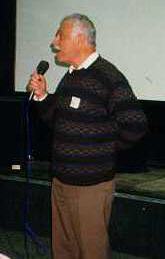 After greeting the
audience, Menachem spoke about the significant contribution made both by veterans
and new immigrants from the former USSR to the development of the State of Israel.
After greeting the
audience, Menachem spoke about the significant contribution made both by veterans
and new immigrants from the former USSR to the development of the State of Israel.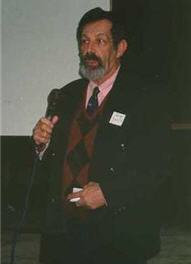 These words, taken from
the title of V. Aksyonov's nice story, could be addressed to all those Gurevichs,
Gurvitzs and other members of the large Horowitz Family who were not able to attend
the meeting organized by The Horowitz families Association .
These words, taken from
the title of V. Aksyonov's nice story, could be addressed to all those Gurevichs,
Gurvitzs and other members of the large Horowitz Family who were not able to attend
the meeting organized by The Horowitz families Association .
The aim of the meeting was to establish connections with new and veteran immigrants from the former USSR who are related to the Family. About 80 members of the Horowitz and Gurevitch families, who live in the Tel-Aviv area as well as in Jerusalem, Ariel, Haifa, Hadera, Haifa and the Lower Galilee, met together in the comfortable hall of the club.
The evening's Master of Ceremonies was Gabriel (Gabi) Horowitz, a former Chairman of the Assocation, whose family originated from Odessa and arrived in Israel after World War II. He introduced the present Chairman of the Association, Menachem Argov, who was born in Tiberias and whose ancestors came to Eretz Israel about 200 years ago.
 After greeting the
audience, Menachem spoke about the significant contribution made both by veterans
and new immigrants from the former USSR to the development of the State of Israel.
After greeting the
audience, Menachem spoke about the significant contribution made both by veterans
and new immigrants from the former USSR to the development of the State of Israel.
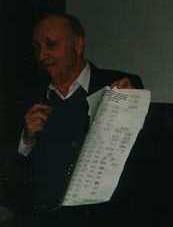 Daniel (Dani) Ophir,
one of the founders of the Association, lectured on the Horowitz Family's history
- all the way from Gerona in Spain to Prague and Eretz Israel.
Daniel (Dani) Ophir,
one of the founders of the Association, lectured on the Horowitz Family's history
- all the way from Gerona in Spain to Prague and Eretz Israel.
The audience listened with much interest to the story of the visit of members of the Association to Horovice in 1990 and how they were received by the local municipal authorities.
The lecture was illustrated by beautiful slides, which aroused an enormous desire in the audience to visit these places.
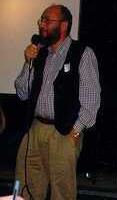 The next person to talk
was Shlomo Gurevich. He spoke about his book on the Horowitz Family history
which was published in
Russian, about the tragic fate of Moscow student Evgeny Gurevich, shot to
death in 1951 by Stalin's executioners, who 27 years before the Prague spring
wanted to change the oppressive regime and to give it the features of "socialism
with a human face". He also spoke about other representatives of the Family:
about the American astronaut Dr. Scott Horowitz, who took part in two orbital
flights in 1996 and 1997 and is scheduled for a light in the year 2000 as a
member of the international crew. He mentioned Shaul (Saul) Gurvich, the famous
Jewish writer at the end of the 19th and beginning of the 20th century, known
by his literary pseudonym Shai Ish-Horowitz, who was a close friend and relative
of the famous Jewish historian Shimon Dubnov.
The next person to talk
was Shlomo Gurevich. He spoke about his book on the Horowitz Family history
which was published in
Russian, about the tragic fate of Moscow student Evgeny Gurevich, shot to
death in 1951 by Stalin's executioners, who 27 years before the Prague spring
wanted to change the oppressive regime and to give it the features of "socialism
with a human face". He also spoke about other representatives of the Family:
about the American astronaut Dr. Scott Horowitz, who took part in two orbital
flights in 1996 and 1997 and is scheduled for a light in the year 2000 as a
member of the international crew. He mentioned Shaul (Saul) Gurvich, the famous
Jewish writer at the end of the 19th and beginning of the 20th century, known
by his literary pseudonym Shai Ish-Horowitz, who was a close friend and relative
of the famous Jewish historian Shimon Dubnov.
Shlomo also spoke about the history and the famous representatives of the Horowitz family and the importance of Jewish genealogical research in general.
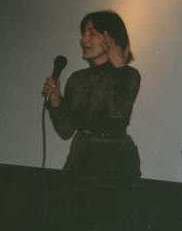 The next person to speak
was the poet Rina Levinson, who is well known among Russian- speaking readers
as well as admirers of Hebrew poetry. She recited some of her wonderful poems.
One of them, Shir Horowitz (A Song Of Horowitz), which had received an award
at an International Poetry Festival, particularly moved the audience.
The next person to speak
was the poet Rina Levinson, who is well known among Russian- speaking readers
as well as admirers of Hebrew poetry. She recited some of her wonderful poems.
One of them, Shir Horowitz (A Song Of Horowitz), which had received an award
at an International Poetry Festival, particularly moved the audience.
The same issue was the central theme of another excellent poem composed by Alexander Gurevich from Rishon-Le-Zion, who recited it in Russian.
Mussya Lipman, veteran of the Jewish Guerilla movement in Lithuania in World War II, told her personal story of the Holocaust: how all the members of her family perished, how she escaped from the Vilna ghetto and joined Jewish resistance fighters, her Aliyah to Israel and her life here.
Sima Sonkin from Tel Aviv spoke about her family and her genealogical research and presented examples of original decorative drawings of family trees.
The Jewish melodies performed by Rami Ophir, Dani Ophir's son, on the accordion, were a pleasant musical interlude and contributed to that very special atmosphere which is generally felt at family gatherings.
The reaction of most of the participants was similar: that such a promising family gathering should become a tradition.
Various other members of the Association, including Sarah and Eliezer Horowitz, Angela Cohen, Monique Zaroni, Rina Hurwitz and its Secretary, Dr. Menashe Horowitz, also contributed to the success of the meeting, and their efforts should be mentioned.
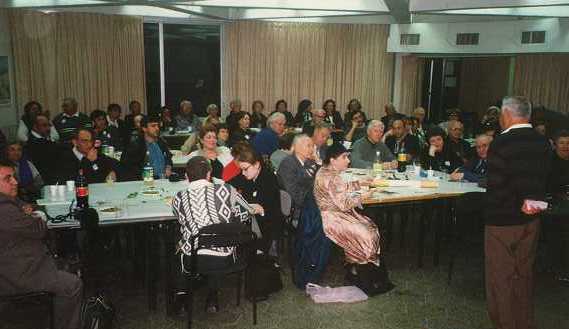
The audience